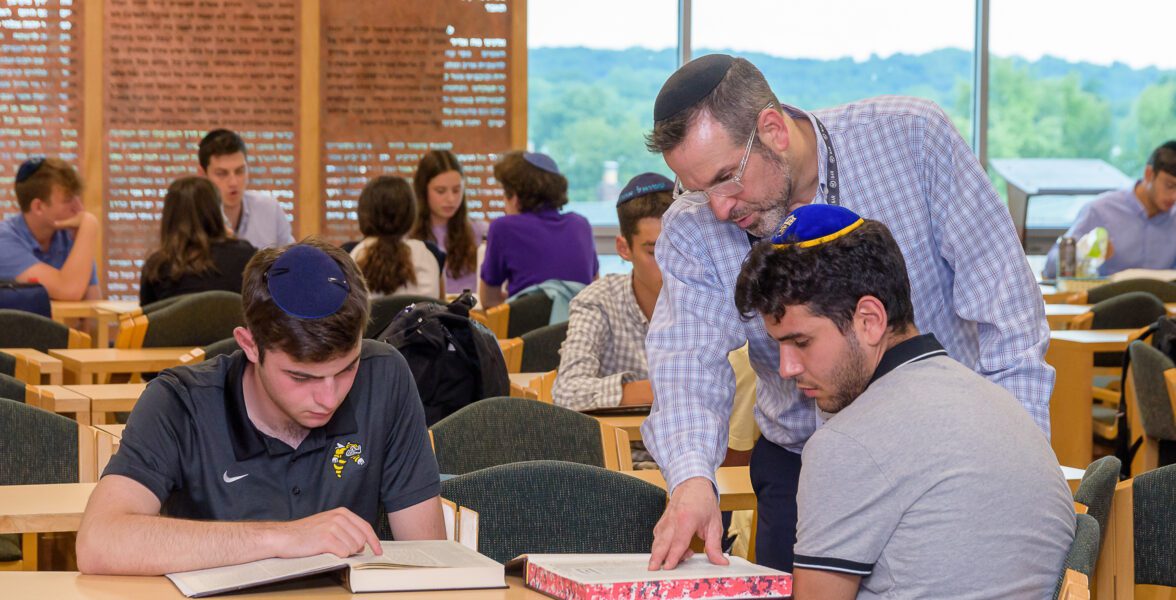
You’ll Look Sweet Upon the Seat of a Bicycle for Two: Reassessing Values During Covid-19 and Beyond
The pandemic has caused us to improvise, innovate, and experiment in ways that we wouldn’t have considered in ordinary times. Some of these innovations will be relegated to mere footnotes in the SAR history books (the idea of a Zoom tisch is great, but I think we all prefer the real thing), while others will be perpetuated even when we re-enter normalcy (parental rates of attendance at Zoom meetings are very high; expect Zoom meetings to be the default for groups of parents.)
Improvisation has been necessary when celebrating milestones as well. It’s beautiful yet heartbreaking to pay a shiva visit on Zoom. There’s something very sweet about it, but I also feel bad for the bar mitzvah boy who ends up layening from a chumash as his grandparents watch their computer screen and socially distant neighbors toss candy in the direction of his home. I sympathize with the young brides and grooms who have dreamt of being walked down the aisle by their parents, feted by friends and family, only to be cast into a backyard with a small group of socially distanced relatives.
While recognizing the anxiety of this season’s brides and grooms and expressing sympathy for them, we can also take a step back and wonder whether aspects of these weddings, too, may be one of those things that we would be wise to consider perpetuating even when we re-enter normalcy.
I began thinking about this recently when I listened to a podcast by two of my rebbeim, Rav Avraham Kivelevitz (former SAR HS teacher) and Rav Yosef Gavriel Bechoffer. As they considered what life after the pandemic would look like, they wondered about weddings. And that got me thinking. I have four children, all of whom with the help of Hashem will find their spouses in the upcoming years. I began to wonder how much a wedding costs. I called a few friends whose children are a bit older than mine and who have already planned weddings. Expect something around 150K I was told. And apparently that’s on the low end!
Perhaps we are ready for a disruption. Maybe now is the moment for us to look in the mirror and ask ourselves, “how in the world did we get here?” Or, more importantly, “how in the world do we get out of here?” I floated the idea generally with a group of SAR grandparents in a zoom town hall and I was surprised by the overwhelmingly enthusiastic response. The excess of our weddings is economically unwise and, more fundamentally, it’s religiously unbecoming. Hiddur mitzvah (beautifying a mitzvah) is a religious value, but there are limits. If you spend $250 on your lulav and etrog, I may think you’ve overpaid but I respect your dedication to ensuring you perform the mitzvah in the most beautiful way possible. But if you spent $2,500 on your lulav and etrog, I’d say you have a problem and it’s time for an intervention. My friends, let’s take a values-based stand. Even those of us who can afford a lavish affair, let’s cut back, not because we can’t afford the bills, but because we want to teach our children that our values have value.
I’d like to offer the first draft of a communal proposal. Consider this a trial balloon to gauge community interest. Now, I know, some will say, “stay in your lane,” why don’t you just address the tuition crisis!” I have two responses to that. First, I actually think that most people who send their children to yeshiva high schools like SAR feel that they are getting good value. They understand that it is very expensive and they are willing to invest a significant amount of money in their children’s education. I suspect that these same parents, though, would shrug their shoulders nonplussed and nervous when asked why they spent the equivalent of five years of yeshiva tuition on a five hour event! Second, while as a school professional I try to reduce costs and make school more affordable, I recognize that sometimes it’s the role of an outsider to call for innovative ideas that disrupt the world of the insiders. I admit that as an outsider, I am probably not fully anticipating the unintended consequences of this proposal on the real people who are part of the Jewish wedding industry and whose livelihoods may be affected. I welcome professionals and others to offer revisions to my suggestions.
To be clear, I’m not arguing for sumptuary laws. That sort of project would fail. The masses will not adhere to a top down diktat demanding a spartan simcha. I’m calling for a market-based solution. A project like this will only work if the community demands it. And the demand would need to come both from parents and the young adults planning their weddings. In order for this to have legs, young singles will have to stand up and say that they are happy to be part of a revolution for social change. Certainly, leadership would help create the supply, namely the venue and infrastructure. In this post, I’m trying to “poke the box” as Seth Godin calls it. I’m trying to see if the reason why the Modern Orthodox community spends so lavishly on weddings is because that’s what we really demand, or is it because we can’t imagine an alternative.
This sort of alternative already exists in the communities of our haredi brothers and sisters. Go to Lakewood, NJ for a wedding and you’ll see an elegant, yet relatively simple, affair take place in a Bais Yaakov. I was there a few months ago and was impressed. It may not have been as lavish as the typical Modern Orthodox wedding, but the food was plentiful and delicious if not as varied. The music was great and the dancing was spirited. And, most importantly, the parents did not take out a second mortgage or deplete their life savings. They may even have been able to help give the newlywed couple a downpayment for their own new home.
So here’s my very tentative idea: Community centers, shuls and other low cost venues offer affordable wedding packages:
- Several food options with $75 per person being the deluxe package
- Basic decorating along with a standard chuppah and a basic flower package
- A reduced guest list
- Family provides the music. No limits.
- Family provides the photographer. No limits.
The goal of the project is to provide relief to families who are spending beyond their means. In this very rudimentary sketch of a plan, a 400 person wedding could cost closer to $40,000 than to $200,000. Of course, the plan I outlined above is a rough draft and I invite more serious thinking about the actual costs.
Although in this proposal, I don’t call for a specific cap on the number of guests, perhaps that also bears consideration. I admit that it is beautiful when all of the friends, business associates and neighbors of both sets of parents attend a wedding. But we have set the default at the point where it’s almost impossible to imagine a wedding with fewer than 400 guests. Must it be that way? Can we imagine a communal norm in which the friends of the bride and groom make up the largest group of guests along with family and a more circumscribed set of the parents’ friends? Can we imagine shifting the communal norms so that small weddings are for 150 people and large weddings are 400 people, instead of considering 400 people a small wedding and 650 a large wedding? Perhaps a way to eat your wedding cake and have it too, is to have the catered part of the affair for the smaller number of friends and family and to invite all of the other guests for the dancing and dessert? I’m not sure what the best plan would be, but I think we need to start brainstorming while we’re still feeling the upheaval and before we revert back to normal.
To highlight the religious value of this proposal, let me bring your attention to an extraordinary excerpt of Sefer Chasidim, a work of 13th century German pietists: Why does the Torah teach us so many laws in such an oblique way? Why all the hints and allusions? Why use hermeneutic tools like a gezerah shava instead of just spelling out the details for us? The answer is remarkable. To do so would inevitably make the Torah’s text much longer than it is and that would demand an exorbitant expense of additional parchment to write such a long Torah! That is at its foundation the Torah communicates a message of התורה חסה על ממונן של ישראל The Torah is concerned about the finances of the Jewish people. If the Torah itself was willing to be less lavish perhaps we can do the same for our smachot.
As I think about our communal norms and the societal expectations that we’ve created, I realize that Jewish weddings are really incredible. They are festive, they are celebratory, and the ruach of a wedding is a genuine point of pride. Guests unfamiliar with the Orthodox community attend a wedding and are thoroughly impressed with what we’ve created. I think though, that we can keep everything that is impressive while reducing cost significantly.
In his opening to The Sacred Canopy, sociologist Peter Berger describes the nature of being a member of a society. It’s worth quoting in full as I close my call for a conversation.
Man produces values and discovers that he feels guilt when he contravenes them. Man concocts institutions which come to confront him as powerfully controlling and even menacing constellations of the external world. The relationship between man and culture is thus aptly illustrated by the tale of the sorcerer’s apprentice. The mighty buckets, magically called out of nothingness by human fiat, are set in motion. From that point on they go about drawing water in accordance with an inherent logic of their own being that, at the very least, is less than completely controlled by their creator. It is possible, as happens in that story, that man may find an additional magic that will bring back under his control the vast forces he has unleashed upon reality. This power, though, is not identical with the one that first set these forces in motion. And of course, it can also happen that man drowns in the flood he himself has produced.



